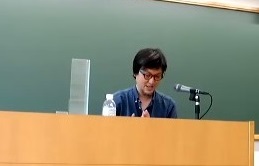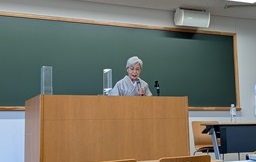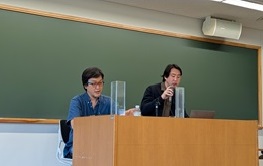【Research Seminar Report】 Hosei University Research Center for International Japanese Studies Transnational Japan Workshop Series (6) “The Washington Post Chief Editor Ben Bradlee and the US / Japan Journalism”2025/10/20
【Research Seminar Report】
Hosei University Research Center for International Japanese Studies
Transnational Japan Workshop Series (6)
“The Washington Post Chief Editor Ben Bradlee and the US / Japan Journalism”
「『ワシントン・ポスト』編集主幹のベン・ブラッドリーと日米ジャーナリズム考」
■ Date/Time: June 21st (Sat), 2025 14:30~16:30
■ Place: Hosei University, Ichigaya Campus, Ouchiyama Building Y506 (Face-to-Face format)
■ Presenter: Tomohiko Nezu (Ritsumeikan University)
■ Commentator: Yuko Tanaka (Hosei University)
■ Chair: Kei Takata (Hosei University)
On June 21, HIJAS held a research seminar, “The Washington Post Chief Editor Ben Bradlee and the US / Japan Journalism,” at the Hosei University Ichigaya Campus. Our guest lecturer, Professor Tomohiko Nezu, specializes in the history of Japanese journalism and has recently published a translation of the autobiography of renowned American journalist Ben Bradlee (1921-2014) from the Hosei University Press. International Japanese Studies is a field in which scholars examine Japanese culture, society, and politics through comparison and transnational connections with other societies. Thus, the seminar was an attempt to understand the Japanese journalism culture and its challenges through the lens of American journalism. For this purpose, we have invited Professor Yuko Tanaka as a commentator, who has actively taken a role as a public intellectual on mass media for many years. Drawing on her firsthand experience in the media, we have asked her to provide comments on Prof. Nezu’s talk and share her perspectives on Japanese journalism.
After a greeting by Professor Yasuko Yokoyama, the director of the institute, Prof. Nezu first explained the background and outline of the book. The first reason Nezu decided to translate this book was inspired by the classic journalism film All the President’s Men, which depicts the Watergate scandal. He and his co-translators worked steadily on the translation and were finally able to publish the book in 2025. This book is a major work depicting Bradlee’s entire life, from his upbringing, his early days as a reporter for a small local newspaper, his time as a press officer for the embassy in France, his work as a Newsweek correspondent, and his time as a reporter for The Washington Post, where he faced the Watergate scandal, the political scandal of President Nixon, as editor-in-chief, which was the golden age of his career. In addition to his turbulent life as a journalist, the book provides a candid account of his private life, including his friendship with President Kennedy and his three marriages, with a detailed depiction as an autobiography written by a journalist. As Nezu noted in his talk, this book offers valuable insights into postwar American journalism through the life of a single journalist, Bradlee, making it a significant achievement in American journalism studies in Japan, given the scarcity of Japanese-language books in this field.
As a translator of the book, Nezu believes that the book’s most important message is the spirit of journalists who refuse to bow to the suppression of free speech. In his lecture, Nezu emphasized the significance of Bradlee’s refusal to yield to power as editor-in-chief and his continued reporting on the Watergate scandal. In fact, one of Nezu’s central themes in his past research on the history of postwar Japanese journalism has been on the suppression of free speech by power. He noted that in postwar Japanese journalism, “the weakness of Japanese editors-in-chief in resisting suppression of speech” is conspicuous. In this context, Nezu particularly finds problematic the “belief toward neutral stance” that has been widely shared among the Japanese media. According to Nezu, Japanese journalism has an “extraordinary fear toward expressing their political assertions.” This stems from the fact that many media professionals fail to fully grasp how their stance of “neutrality” actually benefits those in power. While journalism’s primary role is to report “facts,” the media also have a duty to present their “opinions.” As a reference, Nezu cited an interview with Yuko Tanaka in the Asahi Shimbun, where Tanaka, whom Nezu studied under in university, stated, “My sole focus is on clearly conveying my own opinions,” emphasizing the importance of voicing opinions.
Following the lecture, Professor Yuko Tanaka made comments, mainly as a response to Prof. Nezu’s “passionate” message toward journalism. She mentioned an anecdote from her past Comparative Culture course at Hosei University, where she always included a session on “The History of Newspapers.” She explained that although Japanese newspapers emerged in the form of kawaraban (woodblock-printed news sheets) around the same time as their Western counterparts, they have a regrettable history of serving the government rather than resisting it during subsequent major wars. She went on to say that in the Japanese media, when journalists expose important government secrets, they are often “attacked” in various ways. This has continued to be a contemporary problem, from the Nishiyama Incident in 1971, when the secrets of the Okinawa Reversion Agreement were reported, to the intervention and pressure exerted by the Abe administration on television news programs from 2014 to 2015 towards journalists and commentators critical of the administration. In this context, she commented that there is much to learn from Bradlee’s principled resistance to power.
So, what can be done to improve such a situation? Both Nezu and Tanaka emphasized the significance of education. Nezu expressed concern that “there are extremely few opportunities to learn about the positive role of journalism in Japanese education.” He also lamented that there is even a growing tendency to criticize journalism as “mass garbage (Masugomi)” by the people. He said that journalists themselves need to send a message to the people about the importance and significance of journalism more effectively, and that efforts are needed to make journalists recognized as a “dream job” among young Japanese. In response to these points, Tanaka agreed on the importance of journalist education, suggesting that Japanese universities need departments of journalism to train professionals. However, she also highlighted some positive prospects for journalism, noting that the spirit of journalism endures in new media, such as YouTube, as well as in local newspapers and other marginal media outlets.
The discussion on Japanese journalism culture, which began with Ben Bradlee’s autobiography, went well beyond the scheduled time, with lively debate involving participants from the floor. Apart from the challenges facing journalism, important issues related to publishing in Japan were also raised. Prof. Yokoyama noted that, despite the translation of many important Western texts in the past, the publication of translated research has been steadily declining in recent years, thereby making this publication all the more valuable. While information from outside Japan is becoming readily available online, ironically, there is a tendency for Japanese academia to have declining access to knowledge outside of Japan. This means that while there is a growing need for individuals to access information written in foreign languages, primarily English, directly by themselves, the decline in translation has actually led to a situation where knowledge in the humanities and social sciences is becoming confined within Japan. Of course, the issues of journalism discussed in this seminar and the problem of accessing knowledge from the outside world are distinct challenges. However, they are interconnected in terms of fostering open knowledge that does not yield to power. This served as a reminder that constant effort is required from journalists, scholars, and people for democratic knowledge production under dark times.
Kei Takata (Hosei University)
 Presenter: Tomohiko Nezu |
 Commentator: Yuko Tanaka |
 Chair: Kei Takata |

